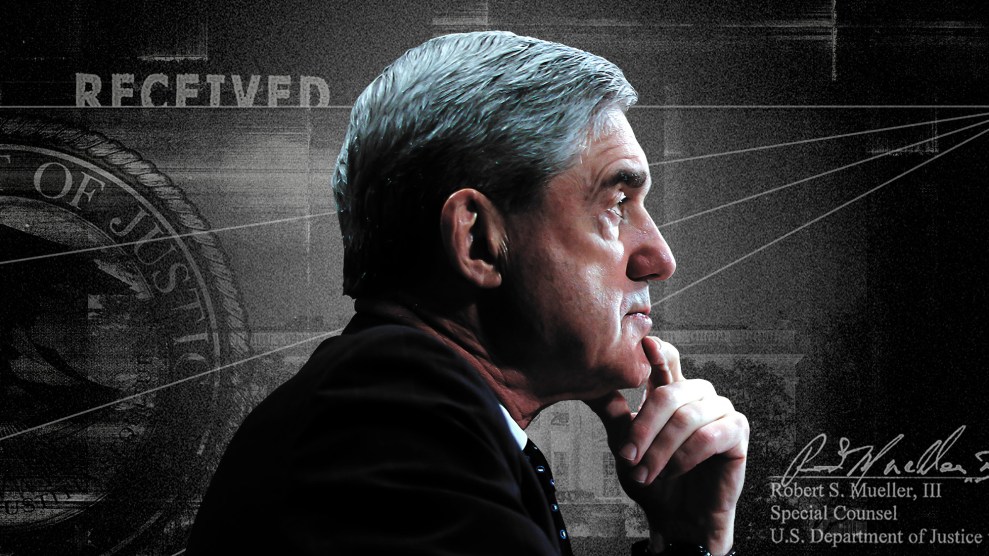
Mother Jones; James Berglie/ZUMA Press; Getty
In his report, Special Counsel Robert Mueller concludes that nothing in statute or the Constitution shields a president from obstruction-of-justice charges. Such charges, he says, wouldn’t have a “chilling” effect on a president’s ability to govern because they require a showing of corrupt motive, which “sets a demanding standard.” That standard rules out obstruction charges related to actions a president takes for political or policy reasons. “For instance, the President’s decision to curtail a law-enforcement investigation to avoid international friction would not implicate the obstruction-of-justice statutes.”
However, direct or indirect action to influence an investigation in order to avoid “personal embarrassment or legal liability” for himself or his family would qualify as corrupt. With that in mind, here’s a selection of conclusions from the report about President Trump’s corrupt intent related to different aspects of the investigation. There are no redactions in the sections I’m quoting:
Firing of James Comey
Substantial evidence indicates that the catalyst for the President’s decision to fire Comey was Comey’s unwillingness to publicly state that the President was not personally under investigation….Some evidence indicates that the President believed that the erroneous perception he was under investigation harmed his ability to manage domestic and foreign affairs….Other evidence, however, indicates that the President wanted to protect himself from an investigation into his campaign….[T]he evidence does indicate that a thorough FBI investigation would uncover facts about the campaign and the President personally that the President could have understood to be crimes.
Attempt to fire the Special Counsel
Substantial evidence indicates that the President’s attempts to remove the Special Counsel were linked to the Special Counsel’s oversight of investigations that involved the President’s conduct—and most immediately, to reports that the President was being investigated for potential obstruction of justice.
Attempts to influence Jeff Sessions
Substantial evidence indicates that the President’s effort to have Sessions limit the scope of the Special Counsel’s investigation to future election interference was intended to prevent further investigative scrutiny of the President’s and his campaign’s conduct….There is evidence that at least one purpose of the President’s conduct toward Sessions was to have Sessions assume control over the Russia investigation and supervise it in a way that would restrict its scope….A reasonable inference […] is that the President believed that an unrecused Attorney General would play a protective role and could shield the President from the ongoing Russia investigation.
Attempts to have Don McGahn fire the Special Counsel
Substantial evidence indicates that in repeatedly urging McGahn to dispute that he was ordered to have the Special Counsel terminated, the President acted for the purpose of influencing McGahn’s account in order to deflect or prevent further scrutiny of the President’s conduct towards the investigation.
Trump’s actions related to Michael Cohen
In analyzing the President’s intent in his actions towards Cohen as a potential witness, there is evidence that could support the inference that the President intended to discourage Cohen from cooperating with the government because Cohen’s information would shed adverse light on the President’s campaign-period conduct and statements.
It’s hard to read the report in its entirety without coming to the clear conclusion that Mueller believed Trump was guilty of obstruction of justice on many, many occasions. In multiple cases, all three parts of his three-part test are present: the obstructive acts are there, the “nexus” to official proceedings is there, and corrupt intent is there.
However, he decided not to recommend charges because he knows the Attorney General disagrees with him about whether the law and the Constitution allow a sitting president to be indicted. Based on the evidence he lays out, this appears to be the sole reason he balked at recommending charges.¹ If this case had been about any other person on the planet—or if the AG didn’t have such strong protective instincts—Mueller would have recommended charges.
In the end, Mueller appears to have backed off because he didn’t want to be involved in a big political fight. This does not speak very well for his willingness to do what’s right regardless of how it might affect him personally.
¹From the introduction to Volume II:
The Office of Legal Counsel (OLC) has issued an opinion finding that “the indictment or criminal prosecution of a sitting President would impermissibly undermine the capacity of the executive branch to perform its constitutionally assigned functions” in violation of “the constitutional separation of powers.” Given the role of the Special Counsel as an attorney in the Department of Justice and the framework of the Special Counsel regulation, see 28 U.S.C. § 515; 28 C.F.R § 600.7(a), this Office accepted OLC’s legal conclusion for the purpose of exercising prosecutorial jurisdiction.


















